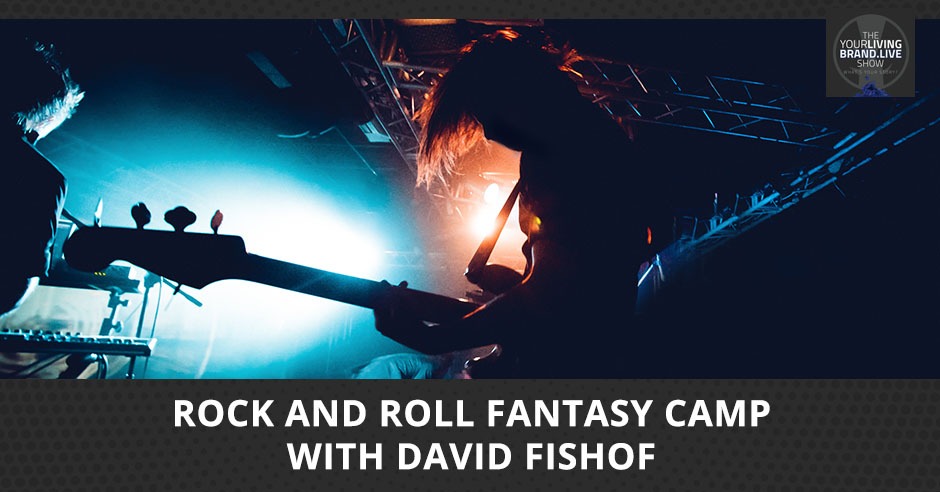
Music can change people’s lives. It gives them passion. And this episode’s guest moved with his love for music to change his life and of others. Like other well-known artists, comedians, and singers, David Fishof’s blossomed in the Catskills. This is where he began to organize and assemble artists for exciting live shows. The greatest production that stands out from the rest was the Rock’ n’ Roll Fantasy Camp. Discover what goes on behind the camp. Find out how it delivers an exceptional musical experience to people worldwide. Join David as he shares about his journey in the industry and passion for music.
—
Listen to the podcast here:
Rock And Roll Fantasy Camp With David Fishof
[00:01:08] In this episode, I have got an amazing, phenomenal guest. This is different from a lot of things we have done in the 300 plus episodes we’ve been on this show. This is something that is completely different. David Fishof is with us. He is the Producer, the brain, the idea man behind the Rock and Roll Fantasy Camp. David, welcome to the show and let’s get into this.
[00:01:33] Ben, thanks for having me. It’s been fun. For the last several years, I’ve been changing people’s lives through Rock and Roll Fantasy Camp. It’s a fun experience.
[00:01:42] First of all, I want to give a shout-out to Marlena Semenza for introducing us.
[00:01:54] I saw her photos. I did her podcast. I got so excited because I think it’s such a different angle that she comes from. I invited her to come to the Women’s Only Rock Camp Mother’s Day Weekend because I wanted her to follow women going through this experience. Hopefully, she can put it in museums and create an exhibition about it because it’s something unique.
[00:02:18] Let’s give you a quick plug for this thing. I think it’s May 6 to 9, 2022, if I remember correctly. You’ve got Melissa Etheridge, who I love. I saw Melissa years ago in little dive bars in Victoria, when I went to the University of Victoria. That’s how long I’ve known Melissa Etheridge. You got Kathy Valentine from the Go-Go’s, Nancy Wilson from Heart and Orianthi. I’m too old to know who this person is.
[00:02:42] Michael Jackson’s guitar player and their solo artists. Kathy Valentine went to the Rock and Roll Hall of Fame with the Go-Go’s and Nancy Wilson with Heart as a member of the Hall of Fame. To put all these women together, I’ll tell you, it was not easy to find the schedule to get them all together now on Mother’s Day Weekend. I have to say, when I reached out to all of them, it was, “Let’s do it.” Everyone loved the idea. I’m excited about that camp. We have another upcoming camp with Desmond Child doing songwriting. While we were doing bands for so long, we’re trying to find other ways that we can share the experience. It’ll be quite interesting.
[00:03:21] We’re going to talk about the experience. We’re going to talk about how this translates into corporate. How does this enable people in corporate to find different parts of themselves and be able to be better versions of themselves? I want to start off with a deep dive into the Rock and Roll Fantasy Camp. What brought this about? Give us a little bit of a history of where you came from because there’s a great story out there between you and who was it?
[00:03:47] Levon Helm.
You have to be passionate about what you do. Unless you have passion in your life, you got nothing. Share on X[00:03:49] We’re going to get into that, but we’re also want to get into you and the Beatles connection. I want to get it to you with the Beatles connection. Start the story and we’ll go from there.
[00:03:58] That’s a long question. Everybody, get you a cup of coffee and I’ve got to talk for a long time. I started in Catskills. I was booking comedians and singers. It was quite interesting working in the Catskills because the comedians would have to get up at 10:30 at night following a singer. They had to entertain an audience that had been stuffed with three meals a day. You ate in the Catskills. Let’s face it. If you went to any of those hotels, you would start off your morning at 7:30. You would go to a coffee shop. You would eat for free, cakes, coffee, then you’d go to breakfast. You eat omelets, oatmeal, lox, smoked fish, then you go back to the coffee shop and eat more cake.
You went to lunch and you had more food, pasta, fishes and loxs. You went back to the coffee shop because you might not have had enough. You went to dinner and dinner was amazing. As a waiter, I worked up there. I went to a side of steak to only steak, no sides. Side of chicken. Give me a side of an animal. I’d want to take all sides of an animal. The way these people eat in the Catskills. Now, they eat and that’s an activity. Eating is an activity.
[00:05:04] It was a daily thing. That’s what you did. You went up there to eat.
[00:05:07] That’s what you did. You went to eat. At 10:30 at night, you have to be entertained by a comedian and a singer. Singing would open up at 10:30, do a bunch of songs and the comedian would come on. These comics, entertaining at 11:00 at night with all those people’s stuff, was hard. These comics were the greatest entertainers. Why? It’s because they have to make these people laugh, unlike people who go to a show and buy a ticket to a show and stand there. They start laughing. They applaud. These people sit back and they say, “I dare you to entertain me and make me laugh because if you make me laugh, my whole food’s going to come out. Everything I ate is going to come out.”
They’re scared to laugh. You would get comics like Larry Best to come out and say, “It’s a pleasure to be here.” All of a sudden, about five chiclets would come out of his mouth. He said, “I have to go to the dentist.” Like mocking a seat came out or another comic will come out and said, “It’s a pleasure to be in my favorite hotel.” They’d look at the Concord Hotel in Kiamesha Lake. These guys were so funny. Milton Berle, Jack Carter, Jan Maree, David Brenner all start in the Catskills.
[00:06:16] This is where they went to test new material.
[00:06:19] You went to entertain an audience. It wasn’t easy, but when you went out to the real world when you opened up for Tom Jones, you opened up in a comedy club or a theater around the United States or Canada. You got huge laughs. In order to make these people laugh up in the mountains, you have to have a great shtick. I started up there. I started booking acts up there. From there, I learned to give people the hits. People want only hit songs. Don’t let your artist do songs that are new songs because that’s when people will take the bathroom break.
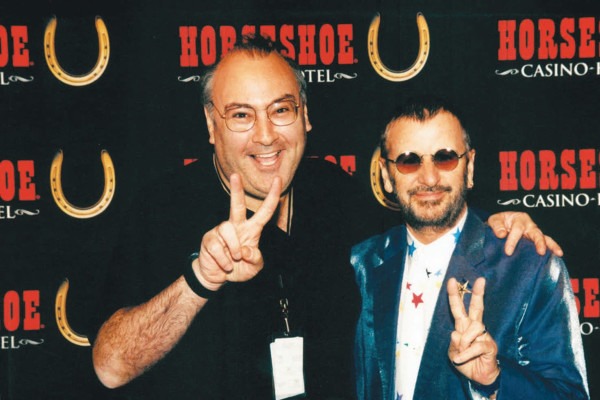
For years, I’ve always presented concert tours. I would put bands together. I created the Happy Together Tour. I created Ringo Starr & His All-Starr Band. I create Dirty Dancing as a live tour. I got into the packaging business, packaging tours, because that’s basically what they did in the Catskills. We packaged these comedians. We would own them for the whole summer. We would book them wherever we wanted to book them. They would have to do those shows where we guaranteed 50 shows. My whole thing was to do these artists only do hit songs. That was number one because I believed that you want to keep people entertained. If they start thinking about other ideas in their life, then it’s not 100%. I want them to think of the show. That was my start.
I started at the Catskills, and then I met a fellow named Herschel Bernardi, the late actor. I was like twenty years old and I would book them for an organization. I started booking him. He said to me one day, “Get out of the Catskills.” Herschel was the star of Fiddler on the Roof. He was a TV show actor on Arnie. He also was the voice of Zenith, “You lock it in. We lock it out.” He was Charlie the Tuna. He had such a diverse career in show business. He said, “David, get out of the Catskills,” and brought me out to the real world.
I started representing athletes, professional athletes. I did that for many years. I had some of the greatest ballplayers, Phil Simms, Mark Bavaro, Lou Piniella. I got bored after a long time because it was about show me the money. It wasn’t being creative. I was sharing office space with so many music managers, Shep Gordon, who had Alice Cooper, Gary Kurfirst, who had the Talking Heads, the Ramones. They all had gold records on the wall. I want to be able to do something creative.
I got a call one day and from a band called The Association. I said, “The association of what?” These guys had done Cherish, Windy and Never My Love. I remember those songs from the dentist’s office. I went out to California to meet them and they were looking for a manager and someone recommended me.
What happened was that I decided to put together, package these bans, The Turtles and The Grass Roots and The Monkees. I started getting the packaging business. 1986 was my first big year where I brought the Monkees back. Unbeknownst to me, MTV was on the 7th and 8th floors. They decided they were going to play 24 hours of Monkees TV shows.
I run upstairs to see the heads of MTV. I remember going to see Bob Pittman. He was the President of MTV. I said, “Mr. Pittman, I’m David Fishof. I see you in the elevator every day.” “You’re the sports agent.” I said, “Yes, but I’m doing The Monkees.” He said, “Sit down, kid. We’re going to be broadcasting 24 hours a Monkees. If you help me promote my fledgling network MTV and all your ads, I’ll promote you on my new network.” I said, “Great. Let’s work together.” Unbeknownst to me, I go on sale. We’re not selling all these amphitheaters. I would do these Happy Together tours with 2,000, 3,000 to 4,000 people. I go on sell with The Monkees and I sell 25,000 tickets in Detroit, 30,000 in Chicago. It’s incredible. Texas stadium sold out.
What happened was that every little girl watching MTV thought The Monkees was a new band. They would go out and buy tickets all night and wait online. They came home and the mothers said, “Where were you all night?” The young lady said, “Mommy, I was buying The Monkees ticket.” “I want to go.” “Do you know the Monkees?”
[00:10:09] It’s a nostalgia thing for the mom. The girls think it’s a new thing.
Strive to change people’s lives. The power of music can do that because it gives people passion. Share on X[00:10:13] The first twenty rows where the young girls and their mothers are on the back screaming. That was my start because that same year, I represented aid in the New York Giants. The whole offensive line and Jim Burden, Phil McConkey and Phil Simms and the Bavaro and all those guys when to the Super Bowl. That was a crazy year for me. In ‘87, the Giants again. I had my players and I decided, “I’m going to do another Monkees tour.”
In ‘88, I came up with the idea to do Dirty Dancing and make that into a live tour. I’d say in the movie, “I’m from the Catskills.” I said, “This will make a great theater show.” I booked into Radio City Music Hall. Again, I sold-out shows at Radio City Musical with one ad. Dirty Dancing was so hot. I would keep coming up with ideas. From a business point of view, my business model was I would go to Corporate America, get them to sponsor my tours and chunky do The Monkees and Mountain Dew. They did Dirty Dancing. These companies wanted to sponsor these tours because they wanted the publicity, the meet and greets.
They could bring their customers to meet the artists beforehand. This is all big for Live Nation. They wanted the signage on the artist stage. Years later, the President of Pepsi approached me. He said, “We love what you do. We love how you package tours. Do you have any new ideas? It’s the 25th anniversary of the Pepsi generation.” I said, “I’m going to come back to you with some ideas.” I remember ordering a diet Coke at lunch. How crazy of me.
He laughed. We laughed. He said, “That means we have a lot of work to do.” I came back to him about a month later. I said, “I had this idea. I have a few different ideas, but one idea I like the most is I always wanted to create an all-star band around Ringo and a little help from my friends. Why not put an all-star band around him?” He says, “You got it. We liked that idea. We’ll back you.” I wrote a letter to Ringo Starr, to his lawyer. Six months later, he responded to me. His lawyer said, “Why don’t you come over to England and you can meet him.” I said, “Sure.” I went and made a pitch to him. I went over there and made a pitch to him. He said to me, “I was thinking the same idea.” We put together the all-star band. I came up with my ideas.
Naturally, I came with Billy Preston because I figured he played with the Beatles. He had his ideas with Levon Helm and I came with Clarence Clemons. We worked this together and that tour was amazing. Joe Walsh and Dr. John. There was nothing like that ‘89 tour. We toured the United States. We toured Japan. After the fourth show, these artists were older than me. I’m not the hip guy. These guys are friends and they all respect each other. I was a young promoter putting it all together. After the fourth show, I’m having dinner with the President of Radio City because Ringo said, “We’ll work with Radio City.” I invited the president of Radio City. Clarence Clemons comes to the show, walks by and says, “Fishof, I’m out of here.”
I said, “What are you talking about?” He said, “This idea is stupid. It’s not going to work. You can’t take all these people from each band and create an All-Star band. It’s one thing if you want to do a benefit and we can do a benefit, but for us to go on tour, it’s not working.” Joe Walsh and Levon Helm are having a fight. I turned to my right as Nils Lofgren walked by. He says, “Fishof, I’m out of here too.” I had mortgaged my house and all I could see the vision of in my mind was, “My house is going down the Hudson River.”
As the promoter, we’d take chances. I said, “Let’s go find Ringo.” Ringo was nowhere to be found. The security guard said, “You better go in there and straighten out this fight or your tour is going to blow up.” I walk in and there’s Joe Walsh with a knife and blood and Levon Helm with a glass bottle of blood. They’re screaming at each other. I walk in scared. If we want to see what happens, you got to see the movie Rock Camp the movie because you see the scene in the movie. It was incredible.
[00:14:06] You got pumped. Let’s cut to the chase.
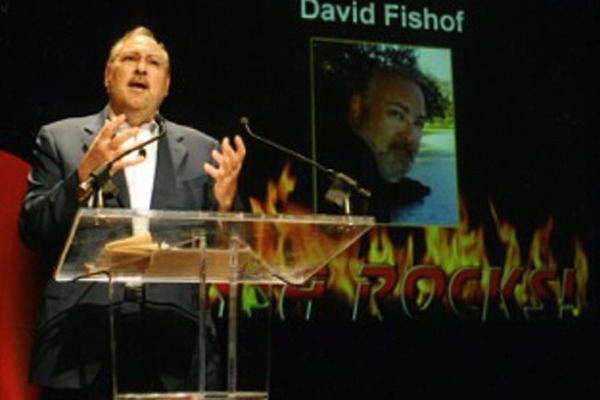
[00:14:08] I got pumped so badly, but I learned to realize how much fun these guys had on the road. They were together. I said, “If I could create this for the fan to let people see what these rock stars are like.” There are amazing people. They’re talented. That’s how I came up with the idea of Rock and Roll Fantasy Camps and it was born several years ago. I started doing these camps and slowly but surely. One day, I decided I was going to get married. I was getting married again and I have kids. I have grandchildren. I love kids. I got married again and had kids. I decided that the road was no longer for me, a place to live. That’s when I came up with an idea. I’ll keep doing my camps and they were fun.
I’ve been doing that for many years, and I want to get to that question you asked about Corporate America because it’s a brilliant question to me. Why? I had the owner of Oracle. His wife bought him to camp. A gentleman named Ed Oates. He said, “Take your whole band and you come to the camp.” He comes to the camp. The first day, he walked in and he says to the Rockstar counselor, Bruce Kulick from Kiss, “Bruce, we want to do this song by the band.” As a matter of fact, they want to do something by the band and the Beach Boys. He said, “Excuse me, sir. I’ve got to teach the song to five other people.” He basically told the guy, “Relax. I don’t care if you’re the owner of Oracle. I don’t care if you start Oracle. This is a band and we’re going to learn it together.”
By the time he left camp, after four days. He turned to me and says, “This was the greatest team-building experience I’ve ever had. I never used to learn to listen.” The key to being in a band is to listen. That’s what makes the band successful is listening to what everybody else is doing. He’s the one who came up with this idea. He says, “Why don’t you do this for Corporate America? Why don’t you create team-building programs?”
One of the fascinating things that we do at Rock Camp is we go into corporate events after they lecture them an entire day of marketing and sales. About 4:00, they send them into a room with a band. They get a backstage pass. They walk into a room and our team-building events start with the band. They start playing a song and I get up there.
I say, “Ladies and gentlemen, say hello to the drummer from Black Sabbath, Vinny Appice. Say hello to the great bass player, Rudy Sarzo. Say hello to Lita Ford. Say hello to this rockstar. Do you see these 8, 9 rock stars up here? It’s going to be your turn to be a rock star. If you got a pass and with a blue pass, you’ve got to go into a room with Ms. Lita Ford. You’re going to rewrite the lyrics to her song and you’re going to come back here after you come up with a name for your band. You practice choreography and you’re going to perform in front of these rock stars and your executives. These rocks are going to play behind you.”
In 90 minutes, these people go into a room. They write about their competition. They write about everything, their bosses. You name it. They get creative. Number one, they get to perform. They learn how to perform, learn how to write, learn how to choreograph. They come together as a band. It’s an amazing team-building experience. That’s where I’ve been able to take music and Rock and Roll Fantasy Camp into Corporate America.
[00:17:44] You have given me an incredible history. I hope people read this and sit there and go, “This is a life that’s been lived.” The experiences that have come out of it and the things that you learned are incredible over God knows how many years. The one word that came out, the whole thing that struck me is people want nostalgia. People want to feel the good times. They want to remember the good times. They want an experience that’s going to give them something that they can sit there and internalize and be able to think about the rest of their lives that say, “I risked a little bit but look at what I got for it.”
[00:18:26] There’s a song that you’re going to learn at camp or that you hear at a camp. Everyone has one song that reminds them of when they were at that time in their life. There’s a program I did many years ago now. It’s called the Hoffman Institute. I went away to a place up in Northern California. You can Google it HoffmanInstitute.org. I went away for seven days. I went to work on David. Who works on himself for seven days? People go to therapy.
Luck is when preparation meets opportunity. Share on XThis was a program I went to for seven days. I immersed myself into my good, my bed, whatever I learned from my parents. Our parents came up with positive and negative traits. It was the most incredible thing and it changed my life. The one thing I like to do at Rock and Roll Fantasy Camp is to take everyone back to their childhood before they ever got hurt before anyone ever hurt them and bring out that passion before they were hurt.
We did 160 masterclasses during COVID, a Rock and Roll Fans Camp. I interviewed Roger Daltrey interviewed Styx. You name it, the biggest rock stars managers, music managers, talent, record executives. We told people to come on Zoom. We’re going to ask a question. You’ll pay money for the question. The artists will give the money to their charities and then would keep it. Whatever they wanted to do it. Styx gave them stuff. Styx and Scorpions get the money for their crew. We’re going to interview Alice Cooper. The greatest thing was we said to them, “One hour.”
I remember texting Alice and I say, “Alice, can you stay on longer because more people have more questions.” She says, “I got nowhere to go.” This was the time where these artists thought they were never going to perform again. They didn’t know. They were only giving out information. The one common denominator that every one of these 160 classes had was passion. They all had passion. Unless you have passion in your life, you got nothing. Why was I a sports agent one time, then I went into music? Why did I tour then want to camp? The minute I lose passion, I’m going to find something else to do.
Maybe I’m blessed that way, but to me, I got to be passionate about what I do. Every morning I wake up and try to create another camp. Whether it’s going to be a songwriting camp, a women’s only, heavy metal or classic rock camp. You name it. I try to be creative every day and keep that passion in myself. If there’s one message that I hope that people get is to get passionate back in their lives because that will keep you living many years.
[00:20:48] That passion, especially during COVID. I have found that so many people have lost passion in their life. People have sat there and say, “I can’t do anything about it. I can’t go anywhere. I can’t do anything. I’m stuck in my house. I’m scared to go and do this and this.” They’ve lost their passion. How do we help people?
[00:21:07] In band, in the live music world.
[00:21:10] The live music must have been devastated.
[00:21:12] I am in the worst business you could be in during COVID because we couldn’t operate. Now, we only operate if you’re vaccinated. We’ve cut our audiences. We lost 40% because only 60% are vaccinated. How do you get it back? You have to find within yourself. What makes you passionate? Whether it’s playing an instrument. A lot more people are picking up guitars during COVID. We saw that. We saw our sales go through the roof once they announced COVID was over in the summer, then this Omnicron came, though. I think once this goes away, we’ll find it again. People should find something, a hobby. Something that they could think they can do that can give them passion in their lives.
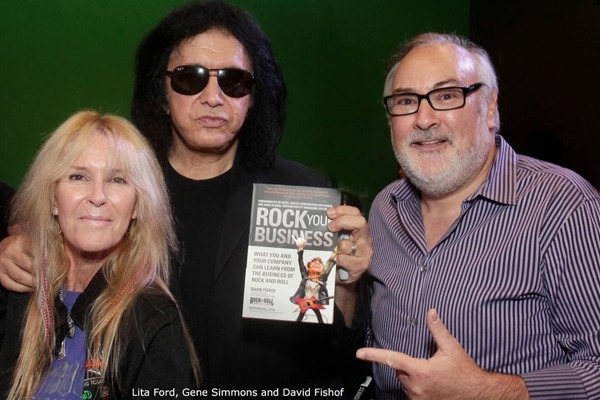
[0:21:49] You’re right. It’s those little things. It’s appreciating the little things in our lives. We all sit there and say, “I can’t do this.” You can’t do this, but you can do this. There are so many things that you can still do. Even down to these conversations, I have been so blessed. Like in February 2020, I was supposed to speak around the world. I had keynotes in Australia and Europe through the Caribbean, through the United States, a year and a half worth of keynotes gone in 72 hours of March. Hundreds of thousands of dollars worth of work. God knows how many miles on airplanes and all the expenses that went with it, but you have to sit there and say, “That’s gone. Now, what do I do now?”
[00:22:32] Write a book.
[00:22:33] That’s what I did. I wrote a book during COVID. We have to sit there and say, “What’s next?”
[00:22:40] Many of the artists couldn’t tour. They wrote music. They stayed home. You can record a full album in your house. Albums were being made. Find other things to do, whether they were writing for movies, for television, for their own albums. People can shift. I’ve shifted my career from sports and to live music, then to camps. I’m always open to shifting and not to be afraid. It’s scary. There’s no question. There’s a fear factor, but I worked on a movie. That was the hardest thing I’ve had to do because I know the live music business. I know to do it, enter the world of making a movie. That was hard, but it took five years. We made a hit movie. Again, you have to keep finding your passion.
[00:23:25] When you’re working with these underground passionate people that love their music. They’re never going to be on stages with 100,000 people. They’re never going to tour around the world, but they love their music. You bring these people together for three or four days to create this experience. How do you help make that experience personal for each and every one of them because you’re building something that they can’t get on their own?
You’re giving them this fantasy life and this experience that they’ll never be able to replicate in any other way. First of all, how do you bring them together? Second of all, elevate them to a way that when you finally put them up on a stage together and the lights go down and the stage lights come up. How do you get them to the point where they sit there going, “I’m ready?”
[00:24:15] I’m going to go backward on the question because I don’t want to lose my thought here. When you play, when you play your instrument with people that are better than you, it makes you better. If you get to jam with Jeff Beck or Rudy Sarzo. You get the jam with any one of these rock star counselors or mentors at rock camp. It elevates your game. You immersed yourself in this experience for four days, but it doesn’t sound like only four days. It starts from the day you sign up. You’re given a letter saying, “Welcome to Rock and Roll Fantasy Camp. If you’re a beginner, learn these songs. If you’re in the mediate, learn these songs.”
People start automatically learning because they’re going to be playing with the songwriters. They’re going to be playing with the Scorpions. They want to learn for five months before they take music lessons. We offer master classes. They start when they lose weight. They buy clothes, whatever they’re going to do.
The only thing that will make a difference is how you treat a child. Share on X[00:25:02] They got a big funky hat so they can look like Slash.
[00:25:05] You’re right because they’re going to be performing on that big stage. Rock Camp, the minute they sign up, they start getting into the excitement of the camp. They’re joining a band with people that they never met before, but people have the same likes and music. They fill out a form. We know where they are. We pre-interview them on Zoom. With the world of Zoom, the bands get together for a few weeks before camp. They decide what songs they’re going to play with the artists.
They’re coming to camp to an Aerosmith camp with Joe Perry. They’re going to play these songs with Joe Perry from Aerosmith that they have agreed to play and they will learn them. By the time they come to camp, they perfect them. The counselors perfect them and they take masterclasses. They take jam rooms. They immersed themselves in this experience. They see the love of the musicians because the rock stars would come to the rock camp.
Once they all come together, it’s not about the money. It’s about, “I was like you. I’m going to show you how to get that passion and how to get it.” You learn from these people. Like you see in the film, Tony Franklin. He’s one of the world’s greatest musicians, bass players that plays fretless bass. You got to be a genius to play that. He teaches beginners. You see Rudy Sarzo, Teddy, and these amazing teachers give you that passion. You start to see these people put their pants on the same way you do. Here’s my number and call me. Let me show you how to record.
We have so many masterclasses where the people walk out of there writing songs. They become a band. I have so many stories. While you see four of them in the movie, each one has a story, but one that comes to mind is a lady calling me up. She says, “My father, he went to your camp. He had never played in a band before. He had a guitar teacher on Saturday mornings. He left your camp and he’s been in a band. He formed a band from the camp.” She said, “David, you should come and surprise us, his first gig.” I show up to the gig. The drummer has a fifteen-piece drum set, two bases. The guitar player has got Marshall lamps, all the sky with about ten guitars. The bass player has five guitars.
[00:27:06] They’ve gone serious on this thing?
[00:27:08] They take it seriously. They find their new passion in life. Nothing like making music. One thing I love about camp, not only do I make new friends at every camp, but I’m changing lives every day. I think the power of music can do that because it gives these people passion in their lives. That’s how we do it. You come to camp. By the way, it’s not easy. If I give you a lay-up, you’re going to say, “Why do I have to come to camp?” If you’re going to put me through to two live performances, a recording studio, writing a new song and jamming with Joe Perry and with Melissa Etheridge. You’re going to work hard, but it’s a good hard.
[00:27:43] Let’s take it to the next level because you brought in these new clients. You gave them an amazing experience. How do you continue the relationship with these people? That’s the thing with business. You can wow somebody once, but it’s wowing them over and over again. Either they become your repeat guests at different camps or they’re the ones that refer you to the new level of people that come into the camp. How do you continue that relationship? That’s what a lot of companies miss out on. Do they miss on how you continue that experience and keep that love between them and the company you work for?
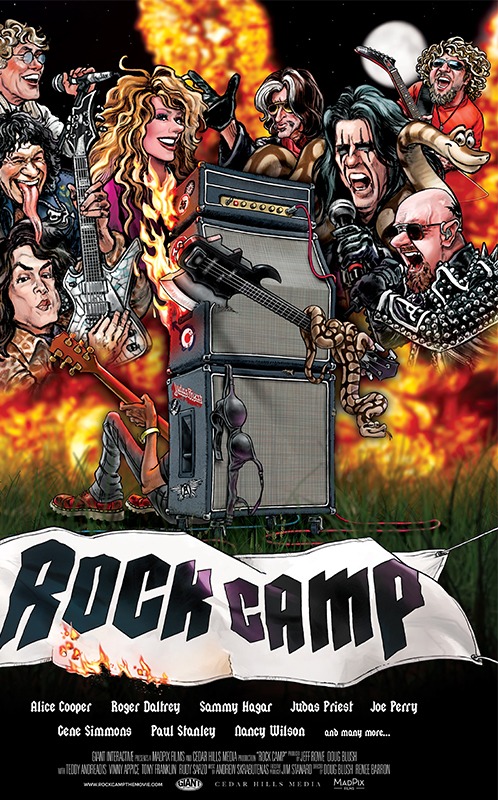
[00:28:19] One of the issues I have is the good thing is once they come to camp, 50% of them come back. Our return campers are amazing. The biggest problem we do have is you have the fear factor. You have the wife who buys it for the husband and he says, “I can’t come. I’m afraid.” He won’t say he’s got it. They use the cancer word. I hate to say it, but my brother, mother, guitar and drum set has cancer. They throw the word around. I said, “You’re coming to camp. Whether it’s not this camp, you’ll come to the next camp.” They land up usually coming, but 50% of our campers come back.
I deal with these masterclasses. That’s why we initiated these masterclasses to keep our campers involved. As much as I can, I try to return campers. They might even come back, whether it’s the guy that goes to the therapist every day. Finally, he calls me up. He says, “David, I’ve got to come to camp.” I said, “Why are you coming back after three years?” He said, “I go to a therapy session every day. I tell him about how great Rock and Roll Fantasy Camp is. ‘You’ve got to go back.’ After taking my money for three years, he said, ‘Go back to rock and roll fantasy camp.’” I do love that. We interviewed a lady. She came to the camp, didn’t make the film, but she was a lawyer.
I asked her afterward. I said, “You left Rock Camp. What happened? Did you get the press when you left?” She said, “Yes, I got a little down, but I ended up writing a book called Rocking the Pink and telling my story. I published it. I landed up writing a song and it got the last spot on Billboard. More importantly, I learned from these rock stars to be authentic. I swore I was never going to be a lawyer again. I quit my law job and I became a writer. I write fiction. That was always my passion to write fiction. I’ve written fourteen books and I’m number one on Amazon. I changed my name to Laura Roppé.”
I said, “That’s great because that’s what it is for me.” I love that people will question themselves and they’ll come away from camp and say, “Maybe I could change my job and find something that’s more passionate or whatever it is.” Something happens when they go through that magic of camp. I went through that Hoffman process. That’s when I changed my old goal of getting off the road as a family man. When you manage these big talents as I was doing. I’ll never forget my daughter or kids who would ask me questions. Was I present? No. I’m going to be honest with you. I wasn’t present.
Do you know why? It’s because I was thinking about Joe Walsh calling me from a theater, or Phil says, “Call on me after the coach was up messed up with them or wasn’t fair to him,” or whatever it was we do as managers and its agents. We hear our players, our talent. I wasn’t present. I learned to become present and now, I have teenage kids. Thank God I got five kids and I got eight grandchildren. I’m present with them and I’m in their lives. I entered their lives. It’s stuff that I didn’t have years ago. I’ve got to tell you, I love it.
[00:31:06] We all learn, hopefully, to be present at some point in our life. Some of us are lucky enough to get it earlier. Some people like me are still working on it, but we’re getting there.
[00:31:18] It’s always a work in progress. I love doing homework. I love taking my kid to a ball game and realizing what’s more important to me. You find it. As you get older, it helps.
[00:31:32] David, we could talk for another hour, but I want to leave it here because I think understanding that there’s experience, being present and the ability to change your life is an incredible thing that we all can be something different. We all can get to that point of our lives where we are sitting there going, “I’ve done this for the last 25 years, but that doesn’t need to be the next 25 years.” Be able to realize that the opportunity to make those changes and reinvent ourselves can happen at any point in our lives. That’s where the real magic is.
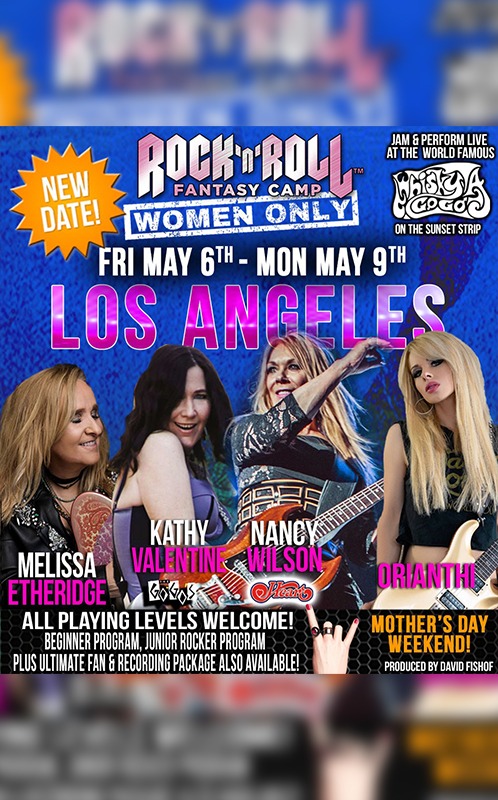
[00:32:06] That’s why I did the movie. I want to talk about the movie. I think it’s important for people to see this movie, Rock Camp. It’s on Amazon. It’s on Apple and on Amazon Prime. You can find them on the Apple Store. My goal for the film is we show Rock Camp and twenty-five years of rock camp. You see how these people go through life-changing experiences through music.
If you decided to create an app, want to go into fashion, be a writer or do a podcast. Whatever you want to do, you can relate to a life-changing experience through Rock Camp because you will see it in the movie. All these people did it through music. You can do it too and that’s the greatest thing I love about the film. I want people to walk away with that passion that they can change their lives.
[00:32:56] I know that there is a highlight reel for the film. The best way to get in touch with you is through RockCamp.com, correct?
[00:33:05] [email protected]. I love to hear from your audience. I love to respond to people. It might take a day or two, but I will get back to them. That’s what my passion is. I can’t tell you how to play it F note. You’ll learn that at camp but anybody who has a good idea, I’d love to listen to them.
[00:33:21] Here’s my last question. This is a question I ask everybody as I let them out the door. When you get off stage and you get your car and you drive away, what’s the one thing you want people to think about you when you’re not in the room?
[00:33:35] Luck is when preparation meets opportunity. You have to put time into it. You have to put a lot of hours in, but that’s how you get lucky. You prepare yourself. That’s my favorite thing. My last favorite thing is I think for this show. On my desk, it says, “In 100 years from now, it won’t make a difference how much money you have, what car you are going to drive or how big your home is. The only thing that will make a difference is how you treat a child.” That, to me, is my message.
[00:34:01] David, you did not disappoint. It was an incredible interview. I’m going to be sitting re-reading this thing again, especially those first parts of the history of your life going, “This is a man who sucks the marrow out of life.” Thank you for being such an amazing guest.
[00:34:17] I appreciate it. Thanks for having me, Ben.
Important Links:
- Rock and Roll Fantasy Camp
- HoffmanInstitute.org
- Rocking the Pink
- Amazon Prime – Rock Camp The Movie
- Apple – Rock Camp The Movie
- [email protected]
- Facebook – Rock and Roll Fantasy Camp
- Twitter – RockFantasyCamp
- LinkedIn – Rock and Roll Fantasy Camp
- Instagram – RockFantasyCamp
About David Fishof
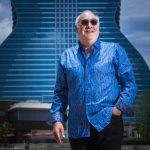 Whether he’s producing a tour, assembling an All-Starr band with Ringo Starr, or writing a best-selling book, there’s one thing David Fishof is always doing: dreaming. Hailed as one of the most creative and innovative entertainment producers in the world, David has been responsible for some of the most original, successful, and exciting live shows ever brought to the stage. But of all the shows he’s put on over his 40-plus year career, there’s one production that stands out from all the rest: Rock ‘n’ Roll Fantasy Camp.
Whether he’s producing a tour, assembling an All-Starr band with Ringo Starr, or writing a best-selling book, there’s one thing David Fishof is always doing: dreaming. Hailed as one of the most creative and innovative entertainment producers in the world, David has been responsible for some of the most original, successful, and exciting live shows ever brought to the stage. But of all the shows he’s put on over his 40-plus year career, there’s one production that stands out from all the rest: Rock ‘n’ Roll Fantasy Camp.
